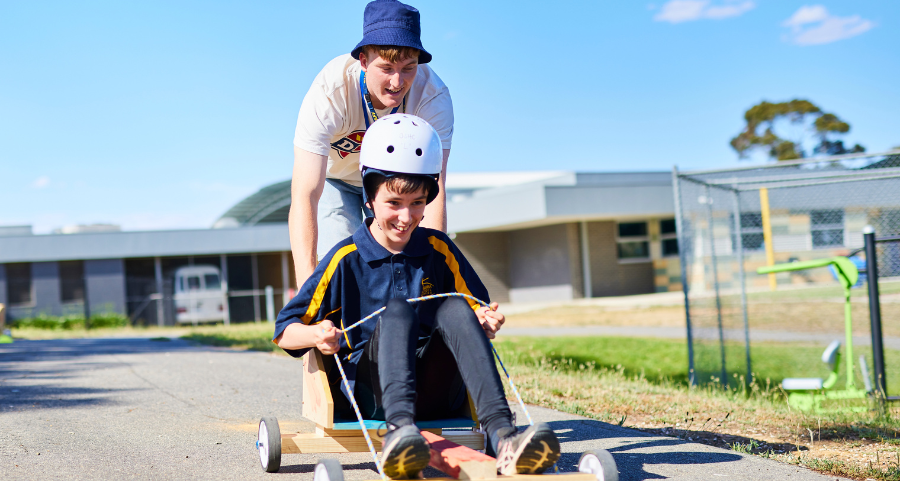OSHC inclusive play adventures
Play is a universal language that transcends barriers and brings children together, regardless of their abilities or backgrounds. For children with disabilities, the importance of inclusive play spaces cannot be overstated. These spaces not only foster social interaction and friendships but also play a crucial role in emotional development.
In this blog, we will explore the significance of inclusive play spaces within Outside School Hours Care (OSHC) programs and delve into the benefits of incorporating adventurous or risky play. By understanding the value of inclusive play and embracing adventurous play experiences, we can create environments where all children, including those with special educational needs and disabilities, thrive and grow.
Download our toolkit: A Day in with Lifely’s OSHC Crew
Power of Inclusive Play
Inclusive play spaces are designed to accommodate children of all abilities, ensuring that no one feels left out or excluded. These spaces recognise that every child deserves the opportunity to engage in play and develop essential life skills. Here’s why inclusive play matters:
- Fosters Social Interaction: Inclusive play spaces encourage children to interact with peers they might not typically engage with. This interaction helps break down barriers, build friendships, and promote a sense of belonging.
- Develops Empathy: When children play together in inclusive environments, they learn to understand and empathise with each other’s challenges and strengths. This empathy carries over into their daily lives, making them more compassionate individuals.
- Builds Confidence: Inclusive play allows children with disabilities to showcase their abilities and talents. This recognition boosts their self-esteem and confidence, helping them overcome challenges they may face.
- Enhances Communication Skills: Communication is a vital life skill. Inclusive play provides opportunities for children to communicate with each other, fostering better verbal and non-verbal communication skills.
- Promotes Independence: Children with disabilities often thrive when given the chance to explore and engage in play independently. Inclusive play spaces offer this independence, empowering children to make choices and decisions.
- Encourages Problem-Solving: Inclusive play often involves collaboration and problem-solving. Children work together to overcome obstacles, enhancing their critical thinking and decision-making abilities.
Benefits of adventure
Adventurous or risky play is a crucial aspect of children’s development. It involves testing boundaries, exploring limits, and experiencing both excitement and fear. This type of child-led play is invaluable for various reasons:
- Learning Through Mistakes: Risky play allows children to make mistakes and learn from them. It teaches them about consequences, responsibility, and resilience.
- Building Confidence: Overcoming challenges in adventurous play builds children’s confidence. When they conquer their fears or navigate tricky situations, they gain a sense of accomplishment.
- Understanding Boundaries: Children learn to understand their own capacities and limits through risky play. They become more aware of their bodies and abilities.
- Embracing Uncertainty: Risky play introduces uncertainty, which is a part of life. Children learn to manage risk and deal with unexpected situations, fostering adaptability and resourcefulness.
- Enhancing Physical Skills: Climbing, running, and exploring challenging terrain in adventurous play promote physical development, strength, and coordination.
Risk for children with disabilities
Children with disabilities often have restricted opportunities to engage in risky play. These children are often perceived as vulnerable, and concerns about their safety may lead to overly cautious environments. However, it’s essential to recognise that risks are not solely located within the child. Sometimes, our anxieties as caregivers can wrap around the children in our care, limiting their experiences.
In the long term, this approach may actually increase the vulnerability of children with disabilities. Fewer opportunities to engage in risky play mean fewer chances to learn how to manage risk and uncertainty effectively. Inclusive play spaces should aim to provide all children, including those with disabilities, with the opportunity to explore their abilities and test their boundaries in a safe yet adventurous way.
Why Lifely Embraces Adventurous Play
Inclusive play spaces within our OSHC programs hold immense potential for fostering social interaction, friendships, and emotional growth in all children, including those with disabilities.
At Lifely, we recognise the value of adventurous and risky play in our OSHC curriculum. By embracing these play experiences, we create environments where children with disabilities learn through their experiences, embrace uncertainty, and develop essential life skills.
At Lifely, adventurous and risky play is an integral part of a well-rounded OSHC program. Here’s why we embrace these play experiences:
- Holistic Development: Adventurous play contributes to the holistic development of children. It allows them to explore their physical abilities, build resilience, and enhance their problem-solving skills.
- Building Confidence: Through adventurous play, children gain confidence as they overcome challenges and master new skills. This newfound confidence extends to other areas of their lives.
- Promoting Independence: We encourage children to make choices and decisions during adventurous play, promoting independence and self-reliance.
- Fostering Social Skills: Adventurous play often involves collaboration and teamwork, helping children develop essential social skills such as communication, cooperation, and conflict resolution.
- Learning Through Experience: Lifely believes in the power of experiential learning. Adventurous play allows children to learn from their experiences, making their education more meaningful and impactful.
For caregivers, educators, and potential OSHC workers, it’s crucial to understand that children with special educational needs and disabilities also benefit from adventurous play. Providing them with opportunities to explore and test their boundaries in a controlled and supportive environment contributes to their overall development and wellbeing.
In the end, inclusive play, combined with adventurous experiences, creates a holistic and enriching environment where children of all abilities can thrive, learn, and form meaningful connections with their peers.
Further reading about inclusive and adventurous play
Department for Education and Child Development in South Australia (DECD)
Australian Children’s Education and Care Quality Authority (ACECQA)
These resources offer valuable insights into best practices and guidelines for creating inclusive and adventurous OSHC environments. They can help potential OSHC workers deepen their understanding and knowledge in this crucial field.




